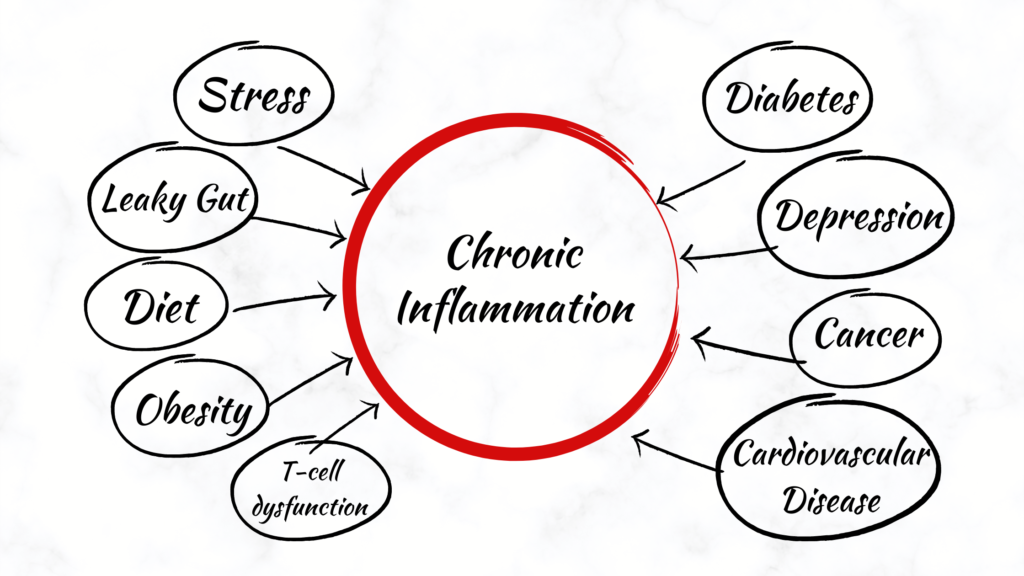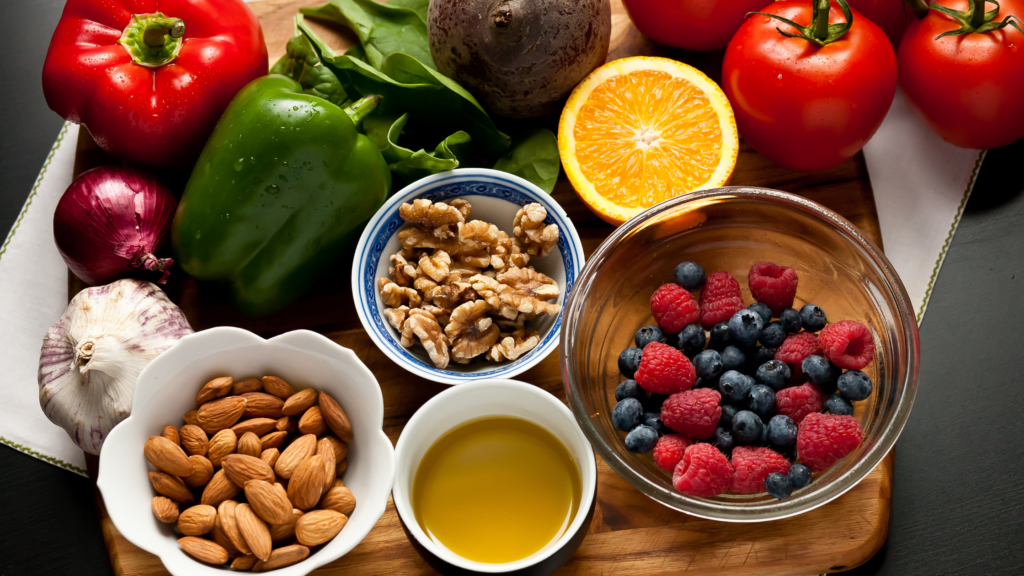Inflammation is your body’s natural defense mechanism that’s a complex biological response that protects you from infections, injuries, and harmful invaders. For instance, when you scrape your knee, catch a cold, or twist your ankle, your body triggers inflammation to start the healing process. While inflammation is essential for healing, it can become harmful when it persists or occurs without a clear cause. Understanding how chronic inflammation works and what triggers it is the first step to improving your health well-being. By making simple changes to your nutrition and lifestyle, you can reduce chronic inflammation, support your body’s healing processes, and lower your risk of chronic diseases.
Types of Inflammation: Acute vs. Chronic
Acute Inflammation
Acute inflammation is short-term and localized. It’s your body’s immediate response to injury or infection, activating white blood cells to repair damage and eliminate harmful pathogens. Symptoms often resolve within days or even hours.
While mild cases may only require rest or cold compresses, severe symptoms like fever or persistent pain may require medical attention.
Chronic Inflammation
Chronic inflammation is a slow-burning, systemic condition. Unlike acute inflammation, it isn’t confined to one area and can persist for months or years, often without noticeable symptoms. Over time, chronic inflammation is linked to many serious health conditions, including:
- Autoimmune diseases (arthritis, lupus)
- Heart disease and stroke
- Diabetes (type 2)
- Neurodegenerative disorders (Alzheimer’s, Parkinson’s)
- Gastrointestinal conditions (Crohn’s disease)
- Mental health disorders (anxiety, depression)
Chronic inflammation can result from infections that don’t resolve, unhealthy lifestyle habits, exposure to toxins, or excess body weight.

Simple Nutrition and Lifestyle Changes to Reduce Chronic Inflammation
Reducing inflammation can significantly lower the risk of chronic diseases. While medications like corticosteroids and immunosuppressants are often prescribed, simple lifestyle changes can offer powerful, sustainable benefits.
Eat an Anti-Inflammatory Diet

A whole food, plant-based diet is key to reducing inflammation. Focus on:
- Fruits and Vegetables: Colorful produce like berries, cherries, spinach, kale, and avocados is rich in antioxidants.
- Whole Grains: Opt for brown rice, oats, and bran for high fiber.
- Healthy Fats: Include omega-3 sources like salmon, walnuts, and flaxseeds.
- Legumes and Nuts: Beans, lentils, and almonds offer nutrient-dense options.
- Spices and Teas: Turmeric and green tea are known for their anti-inflammatory properties.
Avoid inflammatory foods, such as:
- Processed meats (bacon, hot dogs)
- Fried and sugary foods (sodas, candy)
- Refined carbs (white bread, pastries)
Reduce Chronic Inflammation With Physical Activity

Regular exercise is a powerful way to reduce chronic inflammation. It enhances immune function by promoting anti-inflammatory cytokines and reducing key inflammatory markers like CRP and IL-6. Exercise also decreases oxidative stress by boosting the body’s antioxidant defenses, and helps regulate body weight, which lowers inflammation linked to excess fat.
Additionally, physical activity improves metabolic health, gut health, and joint function, further reducing inflammation. By improving circulation and reducing stress, exercise offers a comprehensive approach to managing chronic inflammation and supporting overall health.
Prioritize Quality Sleep

Poor sleep is linked to inflammation and heart disease. Strive for 7–9 hours of sleep each night. Tips for better sleep include:
- Maintaining a consistent sleep schedule
- Avoiding caffeine and screens before bedtime
- Consuming two kiwifruit can increase serotonin production to promote better sleep
Manage Stress

Practice Mindfulness-Based Stress Reduction (MBSR)
Mindfulness-based techniques, such as meditation and breathing exercises, have been shown to reduce markers of inflammation, including C-reactive protein (CRP). MBSR involves focusing on the present moment, which helps calm the mind and decrease stress responses.
- How to Get Started: Set aside 10–15 minutes daily for mindfulness meditation. Apps like Headspace and Calm can guide beginners.
- A 2020 study published in Brain, Behavior, and Immunity found that mindfulness meditation reduced stress-induced inflammation.
Quit Smoking and Limit Alcohol
Smoking is a major contributor to chronic inflammation, as it introduces harmful chemicals into the body that trigger immune responses and oxidative stress. This ongoing inflammation is linked to various health issues, including cardiovascular disease, respiratory conditions, and increased risk of cancer.
Alcohol consumption, particularly in excess, can trigger systemic inflammation by disrupting immune function and altering gut microbiota. This inflammatory response contributes to the development of chronic conditions such as leaky gut, heart disease, liver damage, and autoimmune disorders
Both smoking and alcohol contribute to systemic inflammation in different ways, and when combined, they can have a profound and damaging effect on the body. Reducing or eliminating smoking and alcohol intake can significantly decrease inflammation, improving overall health and reducing the risk of chronic disease.
Build Social Connections

Social isolation and loneliness may seem similar, but research shows that social isolation has a stronger and more consistent association with increased inflammation. Unlike loneliness, which reflects subjective feelings, social isolation refers to the objective lack of social contact and interaction, which can contribute to chronic stress and inflammation over time.
Interestingly, the effects of social isolation on inflammation are often more evident later in life. For example, individuals who experienced social isolation during childhood may not notice its inflammatory consequences until mid-adulthood. This highlights the long-term impact of isolation on health.
One particularly reliable marker of chronic inflammation, known as suPAR (soluble urokinase plasminogen activator receptor), provides evidence of this relationship. Studies suggest that social isolation leads to a higher inflammatory burden, making social connection a critical aspect of managing stress and inflammation.
By fostering meaningful relationships, engaging in community activities, or simply maintaining regular contact with friends and family, you can significantly reduce stress and protect your long-term health.
Regular Health & Dental Check-Ups
Work with your healthcare provider to monitor inflammation markers like C-reactive protein (CRP) and address any underlying issues. Regular dental check-ups are also vital as gum disease (gingivitis) can indicate systemic inflammation.
Keep In Mind
Chronic inflammation is a root cause of many health problems, but you can reduce its effects through:
- A colorful, nutrient-rich diet
- Regular exercise
- Quality sleep
- Stress management
- Avoiding harmful substances
Small, gradual changes in your diet and lifestyle can make a big difference. Start by adding one anti-inflammatory food to your daily meals or incorporating a new healthy habit into your routine.
Ready to reduce inflammation and improve your health? At Core Nutrition Health and Wellness, our expert dietitians offers personalized nutrition counseling and anti-inflammatory meal plans tailored to your unique needs. Contact us today or schedule an appointment to start your journey towards better health.

